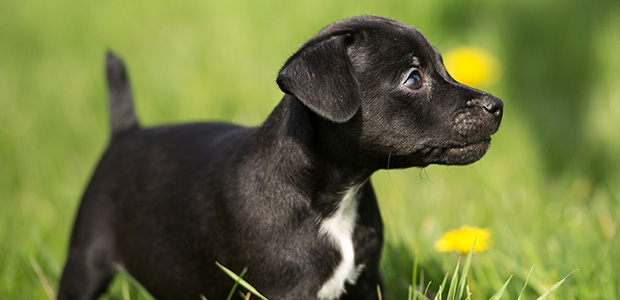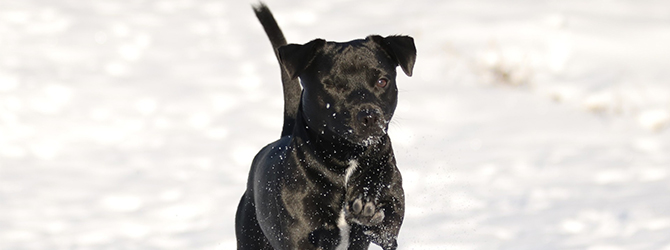Patterdale Terrier: Vet's guide to this lively breed
Patterdale Terriers are typically good-natured and affectionate. They’re classic terriers with lots of energy and an independent personality.
They're named after Patterdale, a village in the Lake District where the breed was originally developed. They were traditionally used for hunting, namely badger control in the UK and groundhogs and racoons in the USA.
Breed Summary:
- First developed in the Lake District in the 1960s
- Average size is 25 – 38cm
- Average weight is 4 – 6kg
- Patterdale Terrier life expectancy = 15 years
- They come in smooth, broken and rough-coated varieties
- Common colours include black, chocolate, tan, blue & red
- Estimated monthly cost = Medium
- Exercise needs = High
- Attention needs = Medium
- Sociability = Medium
Please note: A dog’s exercise, training/stimulation and grooming requirements can depend on several factors such as age and health. The same goes for ongoing costs of ownership. For advice on one specific dog, we always advise chatting with a vet.
How much exercise do they need?
Originally bred in the 1960s to hunt foxes, modern-day Patterdales haven’t lost their fearless, exploratory and active nature. They love to run around and to explore, so it’s a good idea to walk your Patterdale around a secure area – where they can’t escape onto any roads!
They have a strong impulse to chase prey. Owners can channel this by playing lots of retrieve-based games – it might be time for some dog toy shopping!
Patterdales are active dogs and will need two walks a day to stay healthy and happy.
Dietary needs
As an active and energetic dog, your Patterdale will need a balanced diet that’s rich in nutrients, vitamins and minerals.
Growing pups may prefer to 3-4 smaller servings during the day, rather than two larger meals. This can be reduced to two meals a day as your dog gets older.
The recommended portion size will depend on your individual dog. You’ll need to take into account their activity level, age and metabolism. To avoid weight gain, make sure your dog's healthy diet is balanced with plenty of exercise.
For dietary advice that’s specific to your individual dog, have a chat with your local vet or the breeder you’re purchasing your puppy from.
Training: how to train a Patterdale Terrier
Patterdales were bred for their independent and fearless nature. They’re adept at chasing things and bringing them back.
Their independence may make them a bit difficult to train but if you start when your dog is young and if you use positive reinforcement and reward-based training, your dog will be trained in no time! Try channelling their prey-seeking nature through fetch/catch-based games.

Grooming: do Patterdale Terriers shed?
Patterdale Terriers will shed different amounts depending on the type of coat they have: smooth, rough or broken. Generally speaking, their coats are easy enough to keep in tip-top condition – 1 brush per week should do the trick, and you’ll only need to bathe your pup when they’re really muddy.
Complete your Patterdales grooming routine with regular tooth brushing, nail clips and ear checks.
Cost of owning a Patterdale Terrier
When considering the lifetime cost of owning a Patterdale Terrier, remember to take into account:
- Dietary costs for your Patterdale Terrier
- Veterinary care
- Pet insurance
- Kennels or dog sitters
- Toys and equipment
Are they prone to any health problems?
Patterdales are prone to certain health problems, just like all breeds. This doesn’t mean your dog is guaranteed to contract any particular disease – it’s just something to bear in mind.
To keep your dog as healthy as possible, monitor them closely and attend routine 6-month health checks with your vet. This will allow the vet to give your dog a thorough check-up and to pick up on minor (often symptomless) conditions before they have a chance to escalate into something worse.
Before welcoming a new dog into your household, make sure you’re able to cover the costs of any routine or emergency medical treatment they may need. Pet insurance will help massively with this. Why not ask your vet about their recommended pet insurance policy?
Possible health complications include:
- Dental issues and gum disease in dogs
- Infections
- Canine obesity and weight gain
- Dog allergies (including fleas food and pollen)
- Eye problems
- Intervertebral Disc Disease (a condition that affects the dog’s back)
Patterdale Terrier temperament, socialising and ideal home environment
It’s safe to say that Patterdales, like most terriers, prefer humans to other pets and small animals. They make for great family pets and usually get along well with children – providing children know how to handle them.
They'll struggle to tell small animals apart from prey, but if you introduce them to other pets from a young age, they can (and often do) learn to become great friends.
Patterdales are full of energy and enthusiasm, so if you’re looking for a characterful canine to spend lots of time playing games with, you may have met your perfect match.
Suitable for first-time owners?
A Patterdale may not be the easiest companion, especially if you’re a first-time pet owner. They’re very intelligent and can quickly become a handful if they’re not properly stimulated and socialised.
That said, if you lead an active outdoor lifestyle and have done your research beforehand, there’s no reason for a Patterdale not to be your ideal pet.
Need more info?
For more info on finding the best dog breed for you and your lifestyle, have a chat with your vet.
Find your nearest vet using our Find a Vet page, or speak to a vet online using Online Vets.


